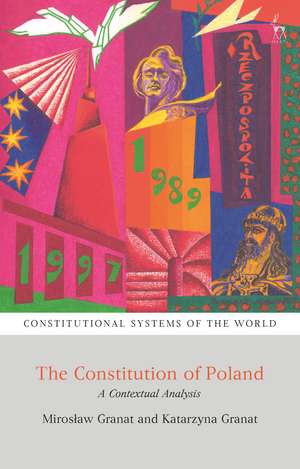The Constitution of Poland: A Contextual Analysis: Constitutional Systems of the World
Autor Judge Professor Miroslaw Granat, Dr Katarzyna Granaten Limba Engleză Paperback – 16 iun 2021
Din seria Constitutional Systems of the World
- 13%
 Preț: 174.07 lei
Preț: 174.07 lei - 38%
 Preț: 134.64 lei
Preț: 134.64 lei - 23%
 Preț: 197.68 lei
Preț: 197.68 lei - 14%
 Preț: 147.59 lei
Preț: 147.59 lei - 34%
 Preț: 509.52 lei
Preț: 509.52 lei - 28%
 Preț: 374.41 lei
Preț: 374.41 lei - 40%
 Preț: 466.81 lei
Preț: 466.81 lei - 23%
 Preț: 185.93 lei
Preț: 185.93 lei - 19%
 Preț: 166.82 lei
Preț: 166.82 lei - 23%
 Preț: 152.82 lei
Preț: 152.82 lei - 21%
 Preț: 218.26 lei
Preț: 218.26 lei - 23%
 Preț: 178.47 lei
Preț: 178.47 lei - 19%
 Preț: 303.62 lei
Preț: 303.62 lei - 18%
 Preț: 300.14 lei
Preț: 300.14 lei - 30%
 Preț: 510.03 lei
Preț: 510.03 lei - 14%
 Preț: 192.30 lei
Preț: 192.30 lei - 18%
 Preț: 304.66 lei
Preț: 304.66 lei - 23%
 Preț: 178.02 lei
Preț: 178.02 lei - 18%
 Preț: 225.31 lei
Preț: 225.31 lei - 23%
 Preț: 197.14 lei
Preț: 197.14 lei - 18%
 Preț: 180.44 lei
Preț: 180.44 lei - 18%
 Preț: 179.98 lei
Preț: 179.98 lei - 18%
 Preț: 186.35 lei
Preț: 186.35 lei - 14%
 Preț: 179.00 lei
Preț: 179.00 lei - 16%
 Preț: 218.47 lei
Preț: 218.47 lei - 19%
 Preț: 184.14 lei
Preț: 184.14 lei - 18%
 Preț: 297.58 lei
Preț: 297.58 lei - 16%
 Preț: 218.00 lei
Preț: 218.00 lei - 18%
 Preț: 232.54 lei
Preț: 232.54 lei - 23%
 Preț: 171.85 lei
Preț: 171.85 lei - 18%
 Preț: 225.49 lei
Preț: 225.49 lei - 14%
 Preț: 185.93 lei
Preț: 185.93 lei - 13%
 Preț: 230.79 lei
Preț: 230.79 lei - 13%
 Preț: 186.10 lei
Preț: 186.10 lei - 19%
 Preț: 179.10 lei
Preț: 179.10 lei -
 Preț: 223.20 lei
Preț: 223.20 lei - 18%
 Preț: 180.44 lei
Preț: 180.44 lei -
 Preț: 217.09 lei
Preț: 217.09 lei - 18%
 Preț: 186.35 lei
Preț: 186.35 lei
Preț: 263.72 lei
Preț vechi: 339.49 lei
-22% Nou
Puncte Express: 396
Preț estimativ în valută:
50.47€ • 52.50$ • 41.67£
50.47€ • 52.50$ • 41.67£
Carte tipărită la comandă
Livrare economică 15-29 aprilie
Preluare comenzi: 021 569.72.76
Specificații
ISBN-13: 9781509952205
ISBN-10: 1509952209
Pagini: 296
Dimensiuni: 138 x 216 x 20 mm
Greutate: 0.35 kg
Editura: Bloomsbury Publishing
Colecția Hart Publishing
Seria Constitutional Systems of the World
Locul publicării:London, United Kingdom
ISBN-10: 1509952209
Pagini: 296
Dimensiuni: 138 x 216 x 20 mm
Greutate: 0.35 kg
Editura: Bloomsbury Publishing
Colecția Hart Publishing
Seria Constitutional Systems of the World
Locul publicării:London, United Kingdom
Caracteristici
Focuses on the Polish Constitution of 1997, concentrating on its structure, its substance and some of the institutional choices made by the drafters, and offering a contextual analysis of its formation within the wider political sphere.
Notă biografică
Miroslaw Granat is Professor of Constitutional Law at Cardinal Stefan Wyszynski University, Warsaw. He served as a Judge at the Polish Constitutional Court from 2007 to 2016.Katarzyna Granat is Junior Research Fellow and Marie Curie Fellow at Durham Law School.
Cuprins
1. Polish Constitutional History and Tradition I. Introduction II. Independence and Republicanism III. Democratic Tradition IV. Freedom in Polish Constitutionalism V. The Evolution of Human Rights in Poland VI. The Development - and Crisis - of Constitutional Review VII. Conclusion 2. The Fundamental Principles of the Polish Constitution I. Introduction II. Key Principles of the Polish Constitution III. Sources of Law IV. The Functioning of the Constitution without a Formal Amendment V. Conclusion 3. Parliament I. Introduction II. The Electoral System and the Composition of Parliament III. The Impact of Political Parties on the Parliament IV. The Functioning of Parliament in the Presence of Majority Governments and Weak Bicameralism V. The Parliament and European Integration VI. The Future of Poland's Second Chamber VII. Conclusion 4. The Executive I. Introduction II. The President III. The Council of Ministers and Government Administration IV. Conclusion 5. Judicial Power I. Introduction II. The Constitutional Structure of the Polish Courts III. Independent Courts and Independent Judges as the Backbone of Judicial Power IV. National Judges as EU Judges V. Conclusion 6. Constitutional Review and Constitutional Accountability I. Introduction II. The Constitutional Court III. Constitutional Accountability (Tribunal of State) IV. Conclusion 7. Local Governance I. Between a Civil Society and a Political State II. Citizens as the Beneficiaries of Local Self-Government III. Self-Government and Government Administration at the Local Level IV. Difficulties in Oversight of Local Self-Government V. Local Self-Government in the EU VI. Conclusion 8. Constitutional Freedoms and Rights I. Introduction II. Three Bills of Rights III. General Principles of Human Rights in Poland IV. The Limited Scope of Individual Obligations V. The Mechanisms of Protection of Fundamental Rights VI. Conclusion 9. Facing the Future I. Introduction II. The Constitution in Action III. The EU's Response to the Judicial Crisis IV. Constitutional Amendment Proposals under Discussion V. The Role of Constitutional Identity in the Battle for the Constitution VI. Conclusion
